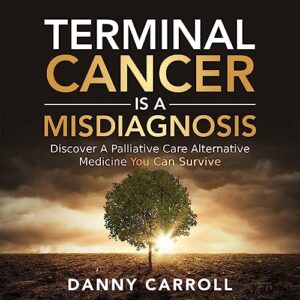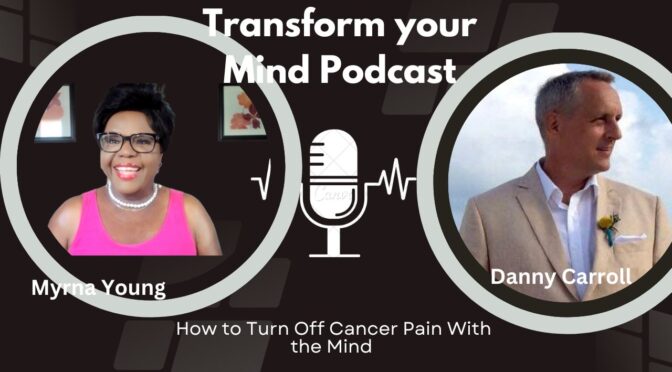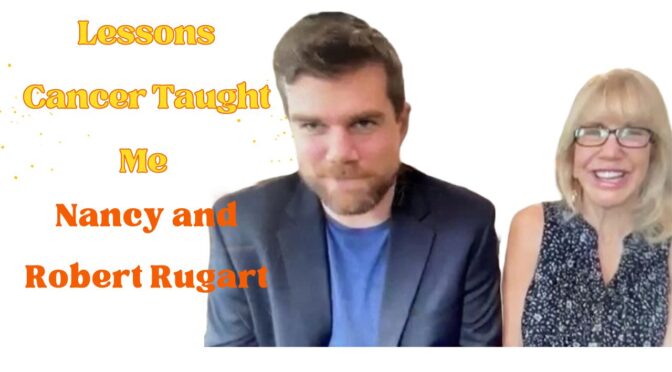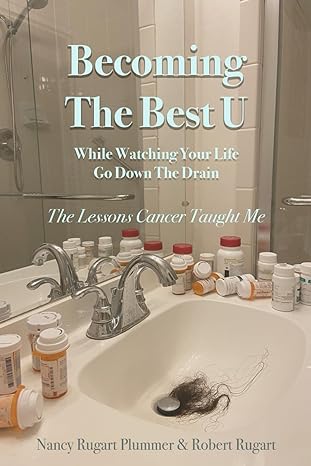In this post Danny Carroll talks about Dr Ryke Geerd Hamer work on terminal cancer. Dr Hamer research indicates that no real diseases exist; rather, what established medicine calls a “disease” is actually a “special meaningful program of nature” and once we identify the cause of the tumor, then you can, turn off cancer, with your mind by telling your subconscious mind that the issue has been resolved.
Download the podcast here:
Abouth the guest
Danny Carroll spent the first half of his life in London, UK, and completed his education with a master’s degree from the London School of Economics. He later moved to India where he now lives and works. Danny has spent the last 17 years studying alternative healing therapies in search of the Holy Grail of health and wellness.
Myrna: Let’s start our conversation today by first looking at cancer, what is it, why it manifests and how we can, turn off cancer pain, with our minds.
Danny: Okay, can I suggest that we start on the fundamentals and we'll do big picture and then we'll go into the detail? Sure. Is that all right? Yes, conversation flows. Yeah, so let's start on your assumption that cancer is a killer, okay? And let's work around that topic and then we'll move into a specific type of cancers from there, okay? Cancer is not a killer. People very rarely die of cancer. People die of, cancer treatments.
Okay, so let me let me let me put some meat around those bones, right? Today's medical system, and this is whether it's conventional medicine or alternative medicine, are systems of symptomatic treatment, okay? I'm a businessman, Myrna, and what I've done essentially is, in business, we have this concept that you can never solve a problem by addressing the symptom of the issue.
If one of my employees comes up to me and says, Danny, I've been trying to solve this problem. And they explain to me that they've only been addressing the symptoms. I'll slap them around the head, metaphorically speaking, of course, and say, you're only looking at symptoms of the problem. You can never solve a problem until you address the cause of the problem.
Sponsored Ad
A little while ago I had the idea, I wanted to sell Tshirts with lifecoaching quotes like A Mind is a terrible thing to waste. I had no idea where to get started. That is why I was so glad I found Shopify (play sound)
Shopify is the commerce platform revolutionizing millions of businesses worldwide.
Whether you’re a garage entrepreneur or IPO-ready, Shopify’s the only tool you need to start, run, and grow your business WITHOUT the struggle.
Shopify puts you in control of every sales channel. So, whether you’re Selling Superfood Smoothies/Offering Organic Omega-3s/or CBD gummies, Shopify has the internet’s best-converting shop to help you turn customers from browsers into buyers.
Sign up for a one-dollar-per-month trial period at SHOPIFY.COM/transform ALL LOWERCASE.
Go to SHOPIFY. COM/transform to take your business to the next level today. SHOPIFY.COM/transform

You can't solve the problem of cancer without addressing the cause
Okay, so I apply those same standards of problem-solving that I use in business, I apply the same standard of problem-solving into health as well, okay? So if we look at the situation that Dr. Hamer was in, for example, the tumor on his testicle essentially is the symptom, it's the outcome of the, so let's play it through. What was the cause of the problem? The cause of the problem was his son getting shot and murdered.
That life crisis, basically, triggers the brain, goes to the part of the brain that manages the testicle, and the brain says, right, we have a crisis. Increase the size of the testicles in order to be able to increase sperm and testosterone production so that we can have a better chance of getting the wife pregnant. But the testicle is just a symptom of the problem.
Okay, the life crisis is the fact that his son was murdered in the same way with the woman whose child got hit by a car, then the cause of the problem is the son, the child getting hit by the car, it goes to the brain and the brain says to the woman's body, okay, we have a crisis, let's get lactation re-going again so that the mother can offer a breast to the child and nurse the child back to health again.
Okay, so the issue that we have in today's healing modalities, and this is both conventional and alternative, all of them, is they're all systems of symptomatic treatment. In conventional medicine, they treat the tumor. The tumor is the symptom, okay? You can never solve a problem by addressing the tumor. You can see that for yourself in conventional medicine. There's a concept called recurrent breast cancer, and that's basically where you have breast cancer again on a breast that's been removed.
Phantom cancer pain
Okay, the breast is no longer there and then you get cancer on a breast that no longer exists. Conventional medicine also has a concept of, phantom limb pain. I have my leg amputated because I've got gangrene or I've got a problem where I've got an issue with my leg, okay? And I still feel pain in the leg after it's been amputated, okay? So the leg is no longer there and I still have pain. That's actually a common thing. It's a very common thing. So, How can, the question you have to ask yourself Myrna, how is it possible to have pain in an organ that is no longer there?
Myrna; How is it possible? Because the brain still thinks it's there, just like how you have an imagination, I guess.
Danny: So let me explain, right? We have a life crisis, all of these programs are run in the brain, the brain is the CPU, the brain is the processing unit that manages this entire ecosystem and the brain sends down the message to the organ, right? The organ is the symptom. It's the output of the problem. You can never solve a problem by addressing the symptom.
You can never solve a problem by addressing the organ, okay? Because it doesn't matter if the organ is there or not, the biological program will still run in your brain. If you want to solve a problem by addressing at the organ level, the only option available to you is essentially to have your head cut off. And that is not a good thing to do. I'm not recommending that you do that.
Myrna: No, that will kill the host.
Danny: We can't run with our heads. We cannot have our heads chopped off, right? But when you look at phantom limb pain, when you look at things like, recurrent breast cancer, when you look at people who still experience colon pain with ulcerative colitis, even after they've had their colon removed, okay? So removing the organ makes zero difference, okay? Because the program still runs in your brain, okay?
Now, this is a problem not only in conventional medicine, but also in alternative medicine. if I go on a vegan diet, so say the child, the woman's walking on the street, the child gets hit by a car and ends up in ICU, okay, the woman's got breast cancer, she feels a lump in her breast, I'll go on a vegan diet or I'll do laetrile or I'll do vitamin C injections or I'll do ozone therapy or immunotherapy or whatever you want to do, right?
It doesn't make any difference because the biological program is designed to keep running until that child is better again. And when the child is better again, basically the purpose of that program has been fulfilled, regardless of whether you offered your breasts to the child to nurse them or not. Once the child is well again, then basically that biological program is no longer required and the subconscious mind will switch it off in the same way it switched it on. Now, the mistake people make is they correlate the treatments they had.
Chemotherapy survival rates
Now, if I put chemotherapy on this program, the effect it has essentially is nothing, okay? All it will do is essentially make me very, very sick and potentially kill me. I mean, of the many studies I've read on chemotherapy. I quote a study carried out by oncologists in Australia in 2004 on, chemotherapy survival rates. This study gave the survival rate of people who take chemotherapy at barely above 2%, which means that chemotherapy kills essentially more than 97% of people who take it.
And it's not so surprising because chemotherapy essentially is mustard gas. Now, why are they using chemotherapy? They're using chemotherapy because they're trying to kill the cells, okay? Because they think the cells have gone wrong. They think the cells have gone wrong because they don't know what causes the problem and they don't know the purpose of that biological program.
So they think these abnormally fast growing cells basically have gone wrong and they're going to start going through your body and metastasize and kill you from within like some internal roaming army. It's nothing like that. The cells have not gone wrong. The cells have gone right. The only thing is we don't understand what causes the problem and we don't understand the purpose of the biological program.
Okay, so they are right in that the cells are abnormally fast growing, but they think that they are fast growing because the genes are broken or because nature is broken or they've gone wrong or it's been caused by pesticides or it's been caused by cell phone tower radiation and this and that and whatever, all of the things smoking and all of those things that they say that makes these cells go wrong. That is an incorrect conclusion. The cells are going right. Okay. Nature in our lifetime will never make a mistake, not a single mistake. The only problem is we don't understand it.
Myrna: Okay, so if I really understand what you're saying is that we can stop cancer and we can, turn off cancer pain, by understanding the cause of it.
Danny: understanding the cause, the cause is critical. You can, Myrna, you can only ever solve a problem by addressing the cause of the problem. You can never solve a problem by addressing the symptom. Never.
Dr Hamer work with cancer patients
Dr. Ryke Geerd Hamer, basically, essentially unraveled the biological code and he has identified the cause to every every cell in our body, whether it's cancer, whether it's multiple sclerosis, whether it's osteoporosis, arthritis, whether it's autism, whether it's down syndrome, whether it's bipolar schizophrenia, he has essentially unraveled the biological code and he has created something called the, Scientific Chart of Germanic New Medicine, which lays out the cause of every health problem that exists on earth today.
If you sign up to my website, you'll download a 400 page book that has the cause to every health problem on this earth, okay? So let me give you one more of my own examples, okay? I got in 2019, I got cancer in my jaw, okay? All of these teeth are false here, right? These are all false. So I had a problem. I had a fight with my wife over American politics, strangely. Anyway, this triggered a cancer in this part of my jaw.
How I turned off cancer by solving the cause of the tumor
This fight with my wife lasted for approximately five seconds. Five seconds. Okay. And because it was such a short fight, it was very difficult for me to identify the cause of this problem, okay? Anyway, by the time I found the cause of the problem, a big tumor had been added to my jaw. I found the cause of the problem after a lot of digging. And then when this tumor is removed, it's removed with something called, TB microbacteria.
TB microbacteria essentially rots the tissue that's been added to remove it, okay? I had the pleasure for a four-month period of having the taste and smell of rotting flesh in my mouth and my sinuses, which wasn't very pleasant, but I understood what was going on, right? In that entire process, all my teeth fell out and it destroyed part of my jaw, right? So then I had to have a five-hour reconstructive surgery with a bone graft on my jaw where I had my my jaw reconstructed and the implants in order to put teeth in because I had no teeth there, right?
So I went for a five-hour surgery. I took one painkiller at the time of the surgery and I took one more painkiller at night before I slept on the day of the surgery, okay? Then I woke up next morning and I thought to myself, I wonder if I can switch this, I hate taking painkillers, right? So I'm like, I do anything I can in order to avoid taking tablets, okay? So I thought, okay, I wonder if I can, switch this pain off. So then I sat there and I thought, right, okay, what is the purpose?
What is the biological purpose of pain? Okay, the biological purpose of pain is to stop you from using a part of the body so it has the time, space and energy to heal, okay? If you cut your finger, okay, If you, when it swells up and becomes painful, if you don't touch it, okay, then you'll have no pain. As soon as you start trying to do the dishes and you put it in hot water, then you go. He's telling you, stop using it. I'm trying to heal this. Let it be. I'll just put it aside for a while. Don't use it. Okay.
How I turned of cancer pain in my jaw
I had 35 stitches, I had no teeth here. Because my, all the teeth fell out, right? But I can't chew on this side of my jaw, right? Cause I've got no teeth. Okay, so I said to myself, oh, okay, I don't have any teeth here, so I'm not gonna use it. So I said to my subconscious mind, right, okay, subconscious mind, I understand that the purpose of pain is to give my body the time, space and energy to heal. I'm not gonna use, I don't have any teeth, I'm not gonna use this side of my jaw, switch off the pain. and bang gone. Pain gone.
Myrna: Oh, wow. That's amazing. Okay. Then what happens?
Danny: So then I slept for 20 hours for three weeks with no pain. But what happened is each time I got up and started eating, sometimes food could accidentally go around to this side of my mouth. Right. And then as soon as the food goes around this side, I'm like, ooh, that was a mistake. So then I said, okay, sorry, subconscious mind, that was actually an error. I'm not reneging on the deal, right, okay? I promise you, I'm not going to use this side of my mouth, because I've got no teeth, right? I'm not gonna use this side of my mouth. Please switch off the pain, bang, gone, pain gone, okay? So then I went through a five hour reconstructive surgery on my jaw.

Terminal Cancer is a Misdiagnosis
Myrna: All right. I think you told me that you can help my friend who has stage 4 Non-Hodgkins Lymphoma, So what do you offer? What is it that you offer? Do you offer a service? Your book talks about palliative care alternative medicine. Do you offer that?
Danny: So my book It's called Terminal Cancers is a Misdiagnosis. This is an introduction to the medical discoveries. This is the first of a 500 plus book series. I've written five of these. The problem with these medical discoveries it's taken me 10 years of applied mind in order to be able to understand these medical discoveries. And the vast majority of people are not going to do that.
So what I'm in the process of doing is writing one book on every disease so that when you have one specific problem, I have a breast cancer problem, or I have a ulcerative colitis, or an IBS problem, or I have a psoriasis and an eczema problem, that I'm writing one book on each disease so that you can read that book, and understand the cause of that problem, and then how to resolve that problem in your life.
Okay, so what I'm what I'm doing, what I'm doing is essentially making these medical discoveries accessible, so that anybody with no knowledge or no understanding of a subject can read, understand and absorb to understand the problem. When you understand the cause of a problem, you have a chance of being able to solve it and, trun off cancer pain. Okay, If you cannot solve it on your own, and on my website, which is my name, www.danny-carroll.com,
I have resources of consultants who like me, been learning these modalities for many years, who you can reach out to, who will guide you on how to identify and resolve those issues in your life.
Conclusion
Okay, so this is the book. It's available on Amazon in audio format, in Kindle format, in paperback and in hardback, and it's available globally. This is essentially an introduction to this body of knowledge. It's autobiographical. It's the journey I've been on over the last 17, 18 years of both studying many modalities, healing myself and healing others. So this is targeted, it's called Terminal Cancer is a Misdiagnosis.
I've targeted this specifically at, terminally ill cancer patients, very simply because in my experience, they're the only people that have the ears to hear this message. So the only the only people traditionally who come to me is when doctors send them home to die. So this is targeted at terminal patients for that reason. However, all of the content in there applies to cancer at any stage, regardless.
It's just most people before the terminal cancer will never pick it up. So that's why it's targeted at terminal cancer patients. It's the first book in a 500 book series. I'm building a new media brand called the Healing Tribune. The tagline is the cause of disease made simple that is available on my website danny-carroll.com all of the 500 books will be available to read for free on my website.
I'm on all, all of my social media @thehealingtribune. So @thehealingtribune on YouTube, on Pinterest, and Facebook.
Additional Resources
https://myhelps.us/dolphin-trainer-finds-purpose-cancer/








